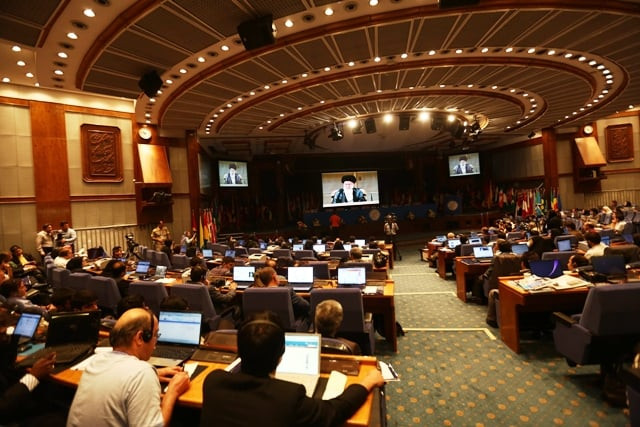Iran nuclear issue, Syria dominate tense Tehran summit
Iran’s leader Ayatollah Khamenei insists in opening speech his country 'is never seeking nuclear weapons'.

Iran nuclear issue, Syria dominate tense Tehran summit
Those issues swept aside the veneer of diplomatic harmony Iran had been trying to project over the gathering of 120 members of the Non-Aligned Movement and left several leaders squirming in their seats.
Iran’s supreme leader Ayatollah Ali Khamenei opened the session with a speech in which he insisted his country “is never seeking nuclear weapons” and accusing the UN Security Council of exerting an “overt dictatorship” under the sway of its Western permanent members, the United States, Britain and France.
UN chief Ban Ki-moon, who looked irritated during the speech, shot back in his own address that Iran should build confidence in its nuclear programme by “fully complying with the relevant (UN) Security Council resolutions and thoroughly cooperating with the IAEA” -- the UN’s nuclear watchdog.
Otherwise, he warned, “a war of words can quickly spiral into a war of violence.”
Egypt’s new President Mohamed Morsi -- making the first visit to Iran by an Egyptian head of state since the 1979 Islamic revolution -- in turn embarrassed the summit’s hosts by stressing that the Syria conflict was a “revolution” like the one his country went through.
“The revolution in Egypt is the cornerstone for the Arab Spring, which started days after Tunisia and then it was followed by Libya and Yemen and now the revolution in Syria against its oppressive regime,” Morsi said.
That directly contradicted the line put out by the Syrian regime and its closest ally Iran that the Syrian uprising was a “terrorist” plot masterminded by the United States and regional countries.
The Syrian delegation, led by Prime Minister Wael Nader al-Halqi, walked out as Morsi delivered his comments.
They missed the Egyptian president adding that “Egypt is ready to work with all to stop the bloodshed.”
The summit to-and-fro over Iran’s nuclear ambitions had its roots in an unusually frank meeting Ban held with Khamenei and Ahmadinejad after arriving on Wednesday.
In those separate talks, Ban told them Iran needed to provide “concrete” steps to ease the international showdown which has raised the spectre of airstrikes on nuclear facilities, threatened by both Israel and the United States as an option.
Tensions have been raised by the International Atomic Energy Agency unveiling a new Iran “task force” to scrutinise Tehran’s nuclear programme and its compliance with UN resolutions.
Additionally, the latest IAEA report on Iran’s nuclear progress was expected to be released this week -- possibly even during the two-day Tehran summit.
The report is said to highlight expanded enrichment in Iran and suspicions concerning an off-limits military base in Parchin, outside Tehran, where warhead design experiments might have taken place.
Ban had been criticised by the United States and Israel for attending the Tehran summit. But before heading to Iran, he promised he would raise the sensitive issues of the nuclear programme, human rights and Syria.
He made good on that promise, and also took Iran’s leaders to task for recent comments calling Israel a “cancerous tumour” that should be cut out of the Middle East, while telling both Iran and Israel to cool the bellicose language.
“I strongly reject any threat by any (UN) member state to destroy another, or outrageous comments to deny historical facts such as the Holocaust,” Ban said in his summit speech.
“Claiming another UN member state does not have the right to exist or describe it in racist terms is not only utterly wrong but undermines the very principles we have all pledged to uphold,” he said.
“I urge all the parties to stop procovative and inflammatory threats. A war of words can quickly spiral into war of violence. Bluster can so easily become bloodshed. Now is the time for all the leaders to use their voices to lower, not raise, tensions,” he said.
A total of 29 heads of state or government are attending the Tehran summit, including those of Afghanistan, India, Iraq, Lebanon, Pakistan, the Palestinian Authority, Sudan, Qatar and Zimbabwe. North Korea was represented by its ceremonial head of state, parliamentary president Kim Yong-Nam, rather than the country’s leader Kim Jong-Un.





1725099588-0/BeFunky-(41)1725099588-0-208x130.webp)













COMMENTS
Comments are moderated and generally will be posted if they are on-topic and not abusive.
For more information, please see our Comments FAQ